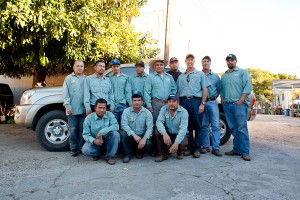This week I will address “unlicensed” Landscape contractors working in Santa Barbara.
First Things First. Let me introduce you to our team. We have been serving Santa Barbara and Ventura counties for over 40 years
Down to Earth Landscapes, Inc
STATE CONTRACTORS LICENSE # 751997
Fully Licensed, Bonded & Insured
Members of the Better Business Bureau and California Landscape Contractors Association
A licensed landscape contractor is not necessarily a measure of competence; however it certainly states a certain degree of professionalism and commitment to the industry. The State of California, through the State Licensed Board promotes quality construction through a licensing and regulatory system designed to protect the health, safety and welfare of the public.
In these economic times, there are many individuals who try to represent themselves as licensed landscape contractors in Santa Barbara. And not all licensed landscape contractors are wonderful, honest and have the best reputation, so let’s clear the air right now – having a license does not make a good contractor.
Hiring a contractor who has a valid contractors license does offer a source of protection to the homeowner and gives a higher level of confidence and The Licensed Board is committed to protecting our citizens against unlicensed contractor activities and scams.
It is important to be aware of the risks when you hire an unlicensed contractor. If the work is not done to code or workmanship standards there is no recourse against the unlicensed contractor, other than through civil courts.
Unlicensed Landscaping Contractor Warning Signs
10 Most Important Warning Signs of an Unlicensed Contractor are;
1. A large down payment is requested before the work begins.
2. You, the homeowner, are asked to obtain the permit.
3. Verbal contract only. The person is not willing to put all terms in writing.
4. The contractor does not have proof of insurance.
5. You are asked to make checks payable to an individual.
6. You are asked to make payments with cash.
7. The contractor does not state “not a unlicensed contractor” on his paper work or business cards. (This is a requirement in California).
8. Has an ROC number on their business cards and contract that does not match the company name.
9. License numbers are not on company vehicle, business cards, advertising, etc.
10. General gardener uses his/her city business license in substitute of a contractor’s license. This number would start with a “0”
3 Questions you should ask your potential landscape contractor .
1. What type of license do you have?
2. Ask to see a copy of their license.
3. Ask for a copy of their workers comp insurance and liability insurance certificates.
Conclusions About Hiring Unlicensed Landscape Companies
An unlicensed Landscape contractor is someone who does new landscaping to your home without the appropriate license. Typically, unlicensed contractors work for less than licensed contractors because they avoid all insurance and licensing requirements. While an unlicensed contractor may provide you with a low price, there are many risks involved in dealing with one:
• Unlicensed contractors cannot obtain building permits so their work is not inspected and more than likely will not be up to code.
• If unlicensed contractors injure themselves, they may sue the homeowner for health compensation.
• Work warranties may be void if installed by an unlicensed contractor.
• Problems may occur during construction, this happens with The average experience in dealing with an unlicensed contractor can be devastating. Most of the consumers that call me for help complain that
- the unlicensed contractor did shoddy work
- the contractor ran off with their money
- or started the job and never finished.
If you’re a unlicensed landscape contractor in Santa Barbara, watch out! You’re days of working in Santa Barbara are numbered!!
The bottom line is, don’t hire an unlicensed landscape contractor! Call a licensed and well-credentialed company today.
When looking to design and install a new garden or outdoor kitchen…..“Hire the natives, not the transplants”.







